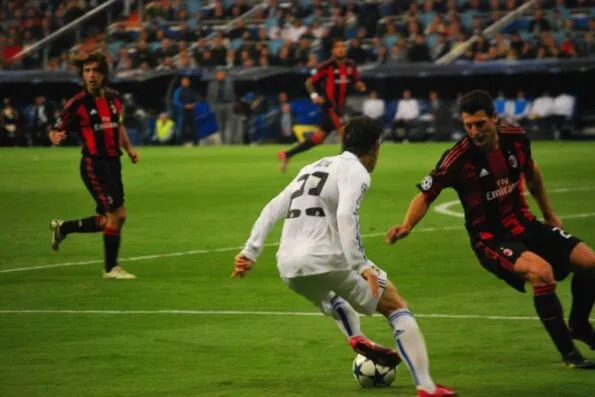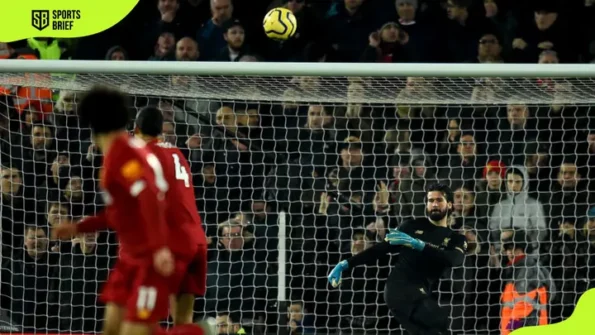If you’ve ever watched a soccer game, you’ve likely heard the term “assist” thrown around. But what exactly does it mean? In this blog post, we’re diving into the world of soccer assists to uncover their importance and impact on the game.
What Is An Assist in Football?
An assist in football, also known as a “key pass,” is a crucial element in the game that often goes unnoticed. It refers to the final pass made by a player that directly leads to a goal being scored by their teammate. Essentially, it is the last touch before a goal is scored and plays an important role in determining the outcome of a match.
The main purpose of an assist is to recognize the efforts of the player who created the scoring chance, even if they did not score the goal themselves. This can include passing the ball to their teammate, setting up a set piece play, or even creating space with clever movement off the ball. The idea behind assists is to acknowledge teamwork and highlight how goals are often the result of multiple players working together.
Types of Assists: Primary and Secondary
Assists are an important aspect of soccer, and they can greatly impact the outcome of a game. In soccer, there are two types of assists: primary and secondary.
1. Primary assists
Primary assists are often referred to as “first assists” or “direct assists.” These are passes that directly lead to a goal being scored. This type of assist can come from a variety of actions such as crossing the ball into the box, threading a through pass to a teammate in scoring position, or even winning possession and quickly passing it to a teammate who then scores.
Primary assists not only require technical skill but also tactical awareness. Players must be aware of their surroundings and anticipate where their teammates will be making runs in order to successfully provide a primary assist. It is also crucial for players to have good communication with their teammates in order for these types of assists to occur.

2. Secondary assists
Secondary assists are passes that contribute indirectly to a goal being scored. This means that there is at least one other intervening touch by another player before the ball reaches its final destination and results in a goal. Secondary assists may not always receive as much recognition as primary ones but they play an important role in setting up goals.
Secondary assists can come from actions such as switching play from one side of the field to another or drawing defenders away from open space for a teammate to exploit. These types of passes may not be flashy or eye-catching but they often require just as much skill and tactical awareness as primary assists.
How Assists are Recorded and Counted
In the game of soccer, an assist is a crucial statistic that helps to measure a player’s contribution to their team’s success. It is often seen as the final pass or play leading up to a goal, but there are specific rules and guidelines for how assists are recorded and counted in soccer.
The first step in recording an assist is determining what exactly constitutes an assist. According to the official rules of soccer, an assist is awarded when a player makes “the last pass or plays which creates the scoring opportunity.”
This means that not only does the pass have to be intentional and purposeful, but it also has to directly lead to a goal being scored. Additionally, if the scorer takes multiple touches or has significant involvement in creating their own goal, an assist may not be awarded.
Once it has been determined that a player deserves an assist, it must then be recorded by the officials during the game. In professional matches, there will usually be an assistant referee who keeps track of goals and assists on their own notes. However, this information can also be confirmed with video footage if necessary.
In cases where there is no assistant referee or video available, it falls upon the head referee to make decisions regarding assists. They may consult with other officials or use their best judgment based on what they saw on the field.
After all of this information has been gathered and recorded accurately during the game, it is then entered into official statistics databases for teams and leagues. These records help players keep track of their personal accomplishments as well as providing valuable data for coaches and analysts.
Famous Players with the Most Assists in Soccer History
Assists are an important aspect of soccer, and they often go hand in hand with scoring goals. While goal scorers may get most of the attention, assists are equally crucial in creating scoring opportunities and ultimately helping teams win games. In this section, we will take a closer look at some of the famous players who have made a significant impact on the game through their exceptional assist records.
1. Lionel Messi – 335 assists

It’s no surprise that Lionel Messi tops the list of famous players with the most assists in soccer history. The Argentine superstar is known for his incredible dribbling skills and eye for a killer pass, resulting in an astonishing 335 assists throughout his career. He has been instrumental in setting up countless goals for both Barcelona and Argentina, making him one of the greatest playmakers of all time.
2. Cristiano Ronaldo – 231 assists
Another modern-day legend who has made a name for himself through his goal-scoring abilities is Cristiano Ronaldo. However, what often goes unnoticed is his impressive assist record, with 231 assists to his name so far. The Portuguese forward’s ability to combine speed, power, and precision makes him a constant threat to any defense and allows him to create numerous scoring opportunities for his teammates.
3. Xavi Hernandez – 277 assists
Xavi Hernandez was the heartbeat of Barcelona’s midfield during their golden era under Pep Guardiola’s reign. His vision, passing range, and technical abilities were second to none, leading to an impressive tally of 277 assists throughout his career at Barcelona alone. Xavi’s understanding with fellow midfielder Andres Iniesta was unrivaled, which resulted in many memorable link-up plays between them.
4. Ryan Giggs – 271 assists
Ryan Giggs’ illustrious career spanned over two decades at Manchester United where he became known as one of the best wingers in Premier League history. His pace and trickery on the ball often left defenders in his wake, but it was his ability to deliver accurate crosses and through balls that made him a key provider for his teammates. With 271 assists, Giggs is the highest assist record holder in Premier League history.
5. Kevin De Bruyne – 145 assists
One of the most creative players in the modern game, Kevin De Bruyne has been a force to be reckoned with since his debut for Manchester City in 2015. The Belgian midfielder’s precise passing and vision have resulted in an impressive tally of 145 assists across all competitions, making him one of the top assist providers in soccer today.
Strategies for Creating Assists on the Field
Creating assists on the field is an essential skill for any soccer player looking to become a top playmaker. It requires quick thinking, excellent vision, and precise execution to successfully create an assist on the field. In this section, we will discuss some strategies that can help you become more effective in creating assists during a game.
1. Develop Your Passing Skills

The first step in creating assists is being able to make accurate and timely passes. A good pass can open up space for your teammates and create scoring opportunities. Work on improving your passing technique, such as using both feet and different types of passes like through balls or lofted passes.
2. Understand Your Teammates’ Playing Styles
To be successful in creating assists, you need to have a good understanding of your teammates’ playing styles. Each player has their strengths and weaknesses, so knowing how they move on the field can help you anticipate where they will be making runs and where you can deliver the ball to them.
3. Scan the Field Constantly
As a playmaker, it’s crucial to have excellent vision of the entire field at all times. This way, you can spot potential opportunities to create an assist for your teammates before they even happen.
4. Know When to Pass vs Shoot
One common mistake many players make is trying to do too much themselves instead of passing the ball when necessary. Deciding whether to shoot or pass depends on several factors such as distance from goal, defenders’ positioning, and your own shooting ability.
5. Use Give-and-Go Plays
A give-and-go play involves quickly passing the ball back-and-forth with a teammate while moving towards the goal before receiving it back in front of the defender for a clear shot or cross into space for another teammate.
6. Pathway Passing
Pathway passing is when you use one-touch short passes to create a direct path towards the goal. This style of passing is effective in breaking through tight defenses and creating scoring opportunities.
7. Master Set Pieces
Set pieces, such as corner kicks or free kicks, often lead to goals or assists. Work on mastering your set-piece deliveries to make the most out of these chances.
Conclusion
As we have discussed, an assist in soccer is an important statistic that recognizes the contribution of a player in setting up a goal-scoring opportunity for their team. It requires skill, vision, and teamwork to successfully complete an assist, making it a crucial aspect of the game. Whether you are a player or a fan, understanding the concept of assists can enhance your appreciation for the sport and its players.
FAQs
A player may not receive more than two assists on any one scoring play. Each assist counts as one point.
Lionel Messi
Karim Benzema
